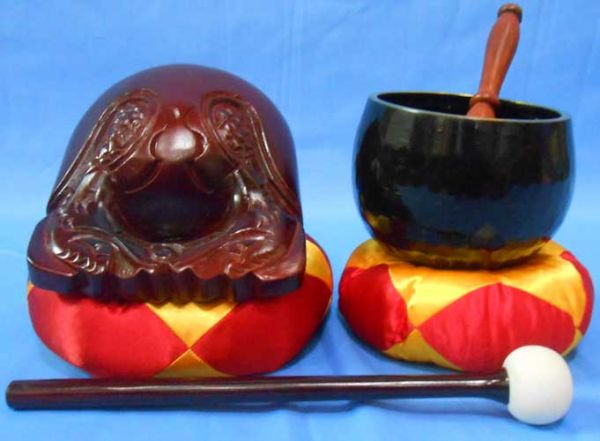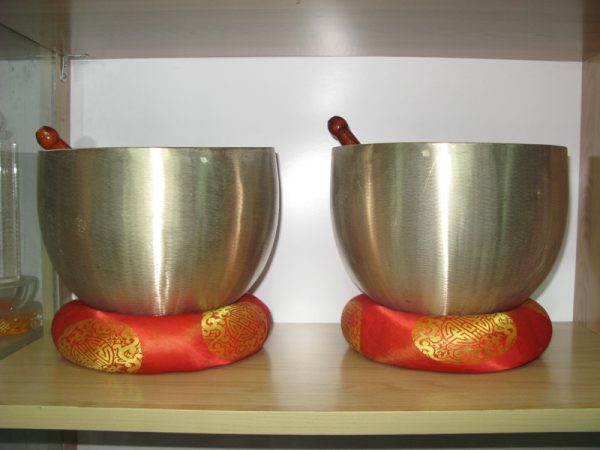Chanting the chanting means we reread the teachings of the Buddha, to understand the meaning and practice properly, so that we can create good results, chanting is also a practice for the three karmas (body, speech, and mind). peaceful.
China is a country with the music ceremony since ancient times. Before Confucius (551ttl-478ttl) period, there were I Ching, Thi, Thu, Ceremony, Music and Confucius writing the book Xuan Thu, who later called it Luc Ching. The ceremony and Chinese Music are nonetheless influential in Buddhist Music Ceremony, the use of drums, bells, and knots during the Buddha's ceremony, the chanting called the bell ceremony, the purpose of which helps those who attend the ceremony, Chanting is more sincere and solemn.

Meaning
The bell is always placed on the left hand side of a statue of a Buddha or a Bodhisattva, and on the right hand side. The caller called Duy na, the knocker called it Browse them.
The bell sounds a quiet sound, late at night listening to the bell will hear the bell, our hearts will be heard, serene, afflictions seem to dissipate. In the temple there are verses when calling for bells as follows:
May we try the bar of super magic world,
Set dark all the period,
Van tran tran pure witnesses,
It is imperative that beings become righteous awareness.
The poem is read when listening to the bell:
Van Chung said sorrowful thoughts,
The chief wisdom of Bodhi birth,
Ly Hell emits fire
Vow to become a Buddha. sentient beings
Judgment of Execution of Ba Ha (3 times)
(That is: May this bell ring everywhere, in the overcast Hell also be heard, in mortality to be purified, all sentient beings become enlightened and the following verse: Hear the bell , defilements lighten, wisdom increases, generates bodhicitta, leaves hell, is not burned by hell fire, vows to become a Buddha to free all sentient beings)
In the temple there is also a poem to read monks and nuns to practice:
Van chung crouched start,
The guardian god of the yard,
The current situation is blessed with silver,
Lai spouse body.
(That is: Lying and listening to the bell and not getting up, making the Dharma protectors angry, in a life of poor blessings, in the next life it becomes a snake body).
So the bell is very important, again while chanting, the bell signaling to the participant that they are about to switch to recite another name, the end of a sutta or a shelf, to start prostrating as well as when standing up. rhythm. Sometimes in the long sutra there are sometimes bells to allow participants to stay awake while chanting.
Ceremony
After the Buddha's table has finished preparing incense, lamps, and fruit, the person who invites the bell will request 6 bells, which means to keep the six sense doors pure for chanting. Each time the master of the amnesty, sometimes a bell, when the master prostrates down, sometimes a bell and when the head of the ceremony touches the main hall, then ring the bell (knock on the ring with the stick and then keep the bell stick on the ring. bell, so that the sound of the bell does not ring.) When the bell rang, the host and everyone who attended stood up.
After the Celebration part, start on the bell as follows:
Previous bell:
Typing typing after the bell ends: - - - - - - - (four hours left, followed by two consecutive hours, finally one sound left)
Then the bell joins each other as follows: * - * - * - - - - *
The bell sometimes sounds for one hour and then another one, the bell has to stop waiting for three hours, the sound for the fourth, the fifth and the sixth sounds in a row, then the bell rings at the same time as the seventh sound.
Each time starting in the Sutta, Mantra or Verse, the drum starts hitting the 2nd, 4th and next sounds, for example:

The Opening Shelves
The noble dharma is very magical ...
Mõ continues to beat evenly with the beat, until the last sentence is about 5 or 7 hours.
… True Tathagata understands deeply.
Or such as:
... Pure great masses of Bodhisattva Ma Ha Slapping!
And the Bell when reciting each name of Buddha or Bodhisattva will sometimes ring a bell, so that people know that they will change to another Buddha or Bodhisattva title, in the long sutta, sometimes at the end of the sentence there should be a bell. At the end of each Sutta, Verse or Mantra, the occasional 3-hour bell is at the 5th, 3rd and last hour, as follows:
… True Tathagata understands deeply.
We should remember that, the instrument is used to keep the rhythm of the chant evenly, the instrument must type quickly or slowly depending on the Lord of the Lord, this person chants slowly, the instrument must type slowly, he chants quickly, the instrument must type quickly, the mantras because does not mean that should always chant quickly, the instrument must type faster than the sutra or the shelf. When reciting the Buddha's name 30 times or above that number, the Host will recite quickly, the instrument must type quickly. When the owner vows not to knock.
The bell is very important when chanting, used to inform the participant that the sutra is about to end, is about to switch to recite the next Buddha or Bodhisattva title. The person who invites the bell must pay attention to when the owner of the ceremony will request a bell, recite the names of Buddha, Bodhisattva or Mantra, the Host will lead them to recite 3 times, 7 times, 10 times, 21 times ... depending case, so pay attention, see the new amnesty for the bell. When the Sutras, Verses, and Mantras are about to end, the Host will recite, recite slowly, loosen, knock slowly, the caller will pay attention to sometimes 3 bells on the 5th, 3rd and last hours. same (if known).
While the person knocked, knocked on the wrong beat or was too fast or too slow, the caller turned the bell again, tapped the bell according to the chant, reciting the chant of the ceremony master, the knower followed according to that.
At the end of the sutra period, the person who requested the bell will request 1 moment and the last 3 hours to leave, symbolizing the preservation of the three karma always being pure. Lay people chanting at home, alone, the bell rituals are the same. Just the bell and the beat to let the dominant hand knock, the other hand calls for the bell, it is not necessary to be the same as said above. While reciting sutras, the bells must be set to level with the elbows, while sitting, the bells must be put down to the main hall, thus it is convenient for knocking.
Conclusion
While chanting the Sutras, apart from the Host, the bells and the knots are very important, so they can keep the chanting rhythm evenly, thanks to the bell, the attendee knows the chant is about to end, recites the title, or when the Buddha's ceremony, bow down. , standing up rhythmically, creating a pure solemn atmosphere. Each of us needs to know the Rite of the Bells and Mocks to use, even though when chanting the Sutras alone, there is a Rite that will help the chanting time to be more solemn and sincere.END=NAM MO SHAKYAMUNI BUDDHA.( 3 TIMES ).GOLDEN AMITABHA MONASTERY=VIETNAMESE BUDDHIST NUN=THICH CHAN TANH.AUSTRALIA,SYDNEY.18/8/2020.VIETNAMESE TRANSLATE ENGLISH BY=VIETNAMESE BUDDHIST NUN=THICH CHAN TANH.